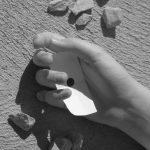A series of health scares helped Kirsti Wishart reassess her judgment of others and find the road back to writing
Support independent, non-corporate media.
Donate here!

First, a confession. For all those fellow writers I commiserated with about novel chapters unwritten, short stories lost or unsubmitted, my understanding smile was false, wavering, as I fought the urge to blurt out ‘Och, just get on with it!’ Because I had a block when it came to writers’ block. To my mind, if you really wanted to devote energy to making stuff up, you could always find the time. Instead of going to the pub, playing a sport, learning how to dance, I’d be at home, typing, taking a chance on whether or not those words would reach others. That didn’t bother me so much – or so I thought. I was all for the pleasure of the process and if it resulted publication, that was an added bonus.
As is often the way, fate stepped in to teach me a lesson. Pandemic panic, increased work pressures, perimenopause whipping up a hormonal storm all served to take up mental bandwidth leaving little space for the waking dreaming of a writing session. Until then I’d always considered writing a solace, a refuge. I realised that to have the confidence to write depends upon a certain level of comfort, a firm grounding granting you the freedom to fly. No matter how bad things got, I would still be able to type through the tears and enter a place of safety. Gradually though that escape route closed up, in part through events I’d expected to have the opposite effect.
During lockdown I had a novel published and then, a year later, another one. A goal I’d longed a lifetime for had been achieved but instead of fulfilment, it froze me. Having work out there left me exposed, years of endeavour reduced to a stranger going ‘Meh’ on Goodreads. I put off switching on the laptop to avoid that phantom future reader hovering over my shoulder, raising a disdainful eyebrow at the latest plot twist.
That and the laptop itself, the tool of my trade, was a problem. Having been taught to touch type in Secretarial Studies at High School, the computer was my default means of writing longer fiction, my fingers quick to capture thought. The shift to working from home meant I was spending up to eight hours and beyond stuck in front of a screen. Without the commute to the office to break that time, it became harder to open up the laptop for fun after the one for work had closed.
Quietly, writing, the activity that had defined me, withered away. I’d tell myself I was fine about it, learning how to be ‘normal,’ relieved of that constant feeling of having homework to do. Deep down though I knew I was kidding myself, experiencing a weird numb itch jigsaws simply couldn’t fill.
Somewhat drastically, it took a pulmonary embolism to suggest a remedy. An appointment at the doctor’s about something else, mentioning an increased shortness of breath led to a trip to the hospital’s Same Day Emergency Care department where I was kidnapped by the NHS for a six day stay. A blood clot had crept across both lungs, squeezing the breath out of me, putting a strain on my heart. Waiting for the anticoagulants to give me breathing space, to slowly wash the clot away, in my hospital bed I began scribbling in a notebook, trying to document what the hell had just happened. The naturalness of the impulse surprised me, as did how much it helped, providing a balm.
I had to accept with mild horror, I was journaling, a practice I’d always been slightly disdainful of, one I didn’t think of it as ‘proper’ writing in the sense of seeking and deserving an audience. For me, for writing to become truly alive it has to be an act of generosity, of communication. If it isn’t shared it might not as well exist. Yet I was discovering writing could be a kindness to yourself, a way of granting some distance and perspective on difficult situations with the added satisfaction of creating something that hadn’t existed a short time before. That and how fountain pens could make writing purely enjoyable, an unexpected gift, the sheer physical pleasure of putting pen to paper reconnecting body and mind.
In the months of recovery that followed not only was I was finding a use for the ridiculous number of notebooks I’d accumulated but a way back to myself. By literally crafting words on a page, taking the time to enjoy each stroke, slowing my breath to a meditative state, calmness returned, the block washed away by a gentle flow of ink.
I’m not quite there yet, still teaching myself writing is its own satisfaction, unlearning years of conditioning equating success with financial reward and the belief that for anything to be truly worthwhile you have to be making a living from it. But I know now a notebook can be a companion, an anchor in your pocket. Like a friend you haven’t spoken to in years, then meet up with and the words run easy, the love a constant, a language shared.
Kirsti Wishart is an Edinburgh-based writer of short stories, novels and other things. Her debut novel, The Knitting Station, was published by Rymour Books in 2021 with her second, The Projectionist, selected by SNACK magazine as one of the ten best Scottish books of 2022. Both can be bought here.









